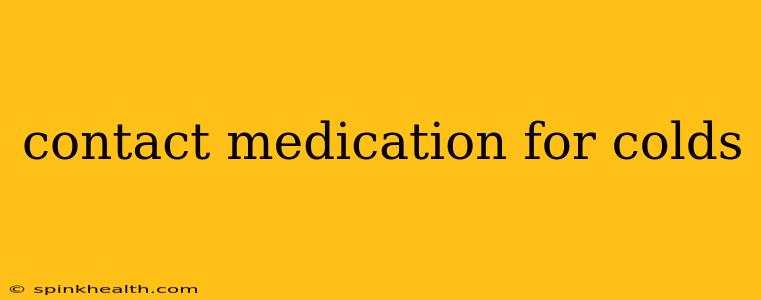Contact Medication for Colds: Finding Relief When You're Stuffed Up
Ah, the common cold. That unwelcome guest that sneaks in, settles in, and makes itself comfortable, leaving you feeling miserable. One of the most frustrating symptoms? That stuffy, congested nose. While there's no cure for the common cold, several contact medications can provide relief from the uncomfortable symptoms, particularly nasal congestion. Let's explore the options and find the best fit for you.
This isn't just about picking any old decongestant; understanding the different types and how they work is key to effective cold relief. We'll delve into the specifics, addressing common questions and concerns along the way.
What are the different types of contact medications for cold symptoms?
This is a crucial first step. The term "contact medication" in this context usually refers to medications that act directly on the nasal passages, rather than being taken orally. These primarily include nasal sprays and drops. Within this category, we find several sub-types:
-
Decongestants: These are probably the most familiar. They shrink swollen blood vessels in the nasal passages, helping to relieve congestion. They come in various forms, including phenylephrine and oxymetazoline. It’s important to remember that overuse of decongestant nasal sprays can lead to rebound congestion, making the congestion worse in the long run. Always follow the dosage instructions carefully.
-
Saline Sprays: These are gentler and often a preferred choice for those seeking a drug-free option. Saline sprays help to moisten and rinse the nasal passages, helping to loosen mucus and clear congestion. They are generally considered safe for long-term use, especially for children.
-
Steroid Nasal Sprays: These are often prescribed for more persistent or severe nasal congestion, especially related to allergies or chronic conditions. They reduce inflammation in the nasal passages, but they're generally not recommended for acute cold symptoms unless a doctor advises otherwise.
How do I choose the right contact medication for my cold?
The best choice for you will depend on several factors, including the severity of your symptoms, your medical history, and your personal preferences. If you have underlying health conditions or are taking other medications, it’s always best to consult your doctor or pharmacist before starting any new treatment. They can help assess the suitability and potential side effects. For mild congestion, a saline spray might be sufficient. For more stubborn congestion, a decongestant spray may provide better relief—but use it sparingly and only as directed.
What are the side effects of contact cold medications?
Side effects vary depending on the specific medication. Decongestant nasal sprays can sometimes cause burning, stinging, or dryness in the nose. In rare cases, more severe side effects are possible, which is why consulting a healthcare professional is crucial, especially if you have pre-existing medical conditions or are taking other drugs. Saline sprays generally have minimal side effects.
Are there any contact medications safe for children and pregnant women?
This is a very important question. Many decongestant nasal sprays are not recommended for children under a certain age. Saline sprays are generally considered safe for children, but always check the product label and consult your pediatrician before using any medication on a child. Similarly, pregnant or breastfeeding women should discuss any cold medication use with their doctor before use.
How long should I use contact medication for a cold?
Overuse of decongestant nasal sprays can lead to rebound congestion, making your congestion worse in the long run. Therefore, it's vital to use these sprays only as directed and for the shortest time necessary. Saline sprays are generally safer to use for longer periods if needed.
What are some natural remedies for nasal congestion?
While contact medications can provide relief, you might find that incorporating natural remedies enhances your recovery. Things like drinking plenty of fluids, using a humidifier to add moisture to the air, and using a warm compress on your sinuses can ease congestion.
Navigating cold symptoms can be challenging, but understanding your options regarding contact medications can help you find relief and get back to feeling your best. Remember, always read the labels carefully, follow dosage instructions, and consult your doctor or pharmacist if you have any questions or concerns. They're your best resource for ensuring safe and effective cold symptom management.

